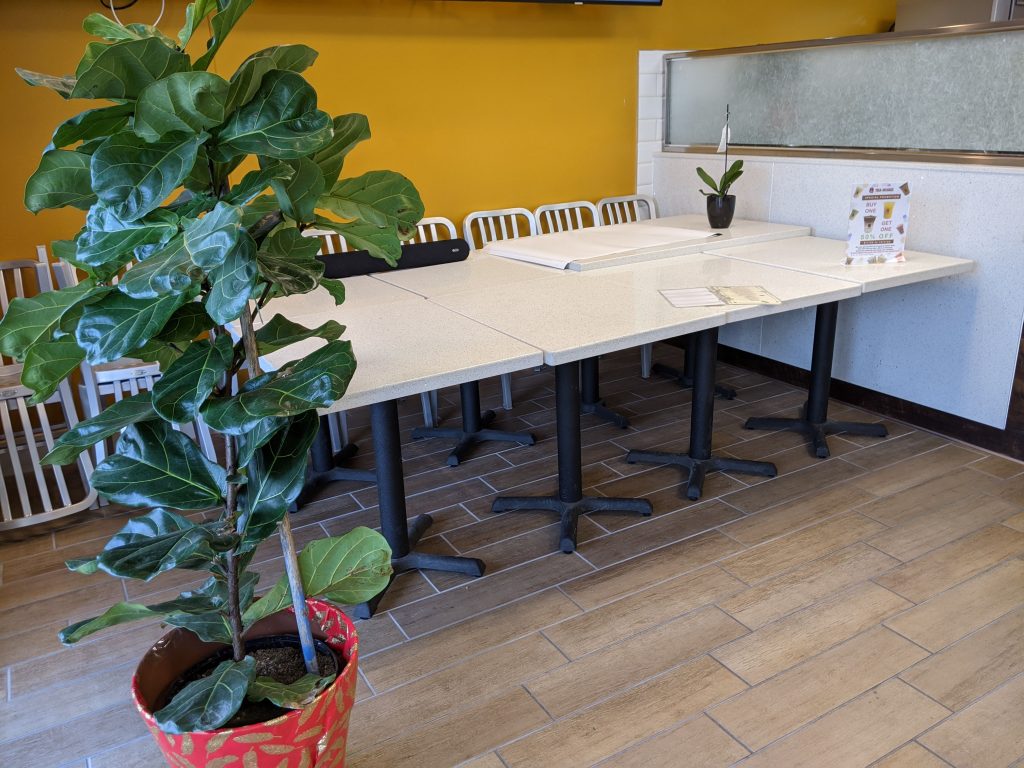
Photo by Tiffany Nguygen: The tables in Ono Tea House have been pushed to the side, leaving space for customers to line up while socially distancing. A menu is placed on the tables for easy ordering.
Ono Tea House adapts to COVID-19 small business challenges
Employees begin to file into the store and prepare for opening: they slide on latex gloves, and wipe down door handles with a strong disinfectant solution. Care and cautiousness are crucial. All it takes is one case of COVID-19 to put the business in jeopardy.
Small businesses have been the most affected by COVID-19 since its declaration as a global pandemic and some have collapsed after years of service. However, Ono Tea House—a local El Monte family-run business—was just starting out. Although Ono Tea House has been open for a short duration of two months, it has not been an easy process.
“We had rented out a place back in April of 2019,” store supervisor Annie Ho said. “COVID-19 really set us back and we couldn’t open until August of 2020. It took like a year and a half [to open].”
In addition, Ono Tea House had to implement the interim guidelines for businesses to follow during their reopening that were issued by The Centers for Disease Control and Prevention and Los Angeles County Department of Public Health. These include consistent employee temperature screenings, sanitation of the workplace, protective equipment for employees and customers, and increased ventilation systems. For Ono Tea House, the soft and grand openings offered an abundant turnout and helped introduce the brand to boba tea lovers. However, adjusting the tea shop to the mandated protocols and effects of COVID-19 was the main challenge.
“We have to spend a lot of money on buying gloves and masks,” owner Sandra Ho said. “It’s like an extra budget we have to have compared to doing business [before the pandemic]. We have to spend a little under $500 per month but it depends on the store or company’s [employee size].”
In the event that COVID-19 has a spike in cases and affects profit, the small business has set aside assets to ensure they stay afloat for at least a year and is prepared to adapt by making specific cuts to their hours.
“If people are more scared and they don’t want to leave their houses, we can just start looking at numbers,” Annie Ho said. “[We] can see that maybe we should be closing on Mondays and Tuesdays and have shorter hours. [We would] minimize the contact and optimize the days [in which] people are most likely to come.”
To combat this fear, the employers at Ono Tea House incorporated business and marketing strategies to appeal to customers despite COVID-19 limitations. They emphasize their stamp card loyalty program with points and rewards and advertise ongoing promotions on Facebook, Instagram, and Yelp to encourage “customer intimacy.”
“We’re still establishing our [brand] name,” Sandra Ho said. “Our main priority is serving quality drinks. [We want to] get customers coming back and to invite new customers to try out our drinks.”
Eventually, the owners want to expand their business to other locations with the core value that “quality does not have to be compromised” in spite of the circumstances.
“It’s hard but everyone has to start somewhere,” Annie Ho said. “You kind of learn how to adjust to the environment [and] every day is a learning experience.”
Resources for small business owners:
U.S. Small Business Administration small business guidance and loan resources
County of Los Angeles small business resource guide
County of Los Angeles Department of Public Health COVID-19 safety compliance certificate program
Los Angeles Regional COVID Fund small business grants, loans, and coaching tools